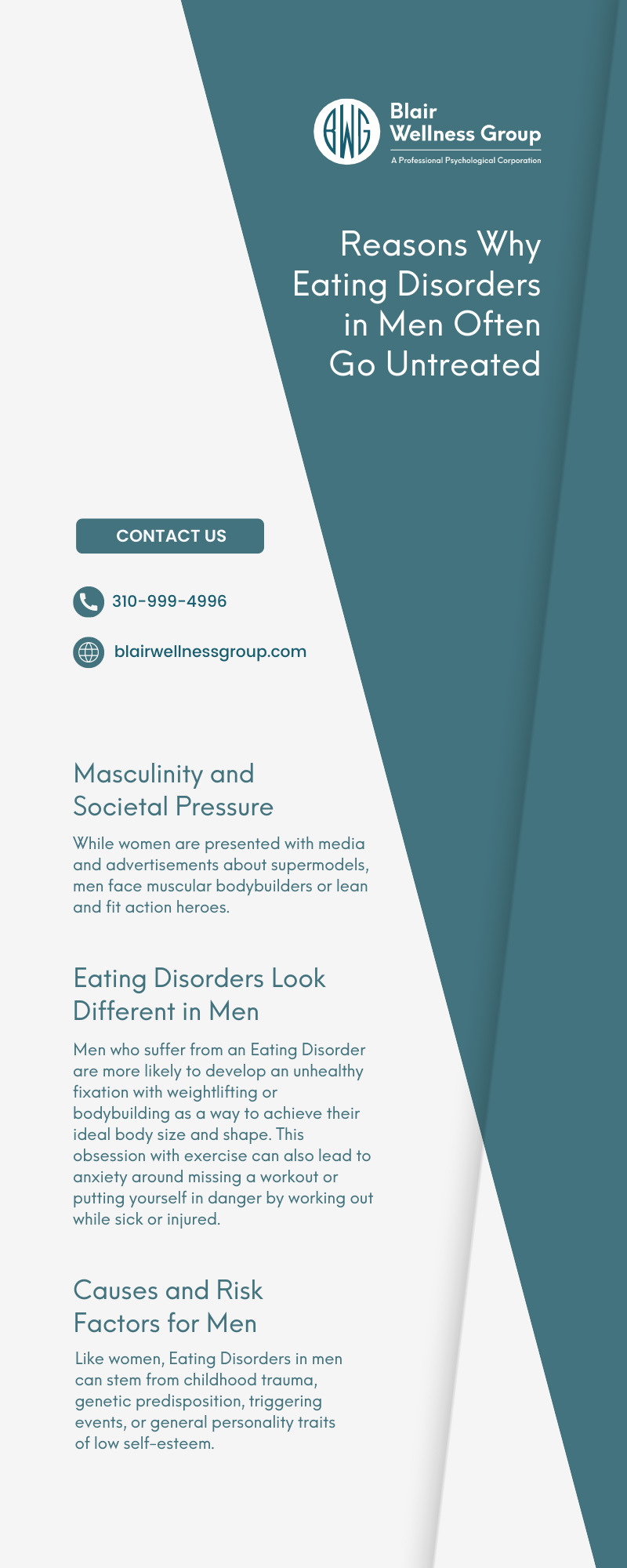Eating Disorders are serious and unfortunately common conditions. When you develop an unhealthy psychological or emotional relationship with food, it can lead to severe health consequences.
Many people view Eating Disorders as a condition that affects primarily women, but many men experience Eating Disorders as well. In fact, men face unique challenges regarding the stigma, symptoms, and treatment of Eating Disorders. Understanding these unique challenges allows us to understand the reasons why Eating Disorders in men often go untreated. With this knowledge, Licensed Clinical Psychologists can give men the treatment they need to heal from their unhealthy relationship with food and achieve an overall healthier lifestyle.
The Dangers of Eating Disorders
Anyone, regardless of gender, can suffer from an Eating Disorder. Eating Disorders revolve around a negative fixation on body weight and image and can result in destructive behaviors such as self-starvation, bingeing, purging, or performing unhealthy amounts of exercise.
Eating Disorders affect both mental and physical health. Many individuals with Eating Disorders also experience Mental Health Disorders such as Depression or Anxiety Disorders. Eating Disorders also lead to severe medical conditions. Malnutrition, digestive issues, and heart disease are just a few of the serious health consequences that can stem from an Eating Disorder.
Without treatment, Eating Disorders and the health problems that stem from them only worsen. That’s why it’s crucial for individuals with an Eating Disorder to seek professional help from a Licensed Clinical Psychologist. Unfortunately, many men find it harder to receive a diagnosis and treatment for their Eating Disorder. Some men don’t even realize the challenges they’re facing stem from an Eating Disorder. There are many reasons why Eating Disorders in men often go untreated, including societal misconceptions, gender-specific pressure, and more.
The Misconception of Eating Disorders and Gender
Eating Disorders are traditionally associated with women. To this day, many people believe that Eating Disorders only affect women and girls, but this isn’t true. Eating Disorders affect men, both in adulthood and adolescence.
Like women, men face pressure from the media, social groups, and other sources to achieve an ideal body type. The desire to be perceived as attractive, fit, or popular can lead boys and men to adopt harmful eating and exercise habits to help them achieve that ideal body type.
Unlike women, however, men don’t have as many resources to offer education, support, and treatment regarding Eating Disorders. Because of this, men who suffer from Eating Disorders tend to feel more isolated and go longer without getting treatment.
Masculinity and Societal Pressure
Men who experience Eating Disorders face different pressure and expectations than women with the same disorder. Society’s ideal body type for women is different than the ideal body type for men. While women are presented with media and advertisements about supermodels, men face muscular bodybuilders or lean and fit action heroes.
Both boys and men compare themselves to images of buff male role models. When they don’t live up to society’s ideal image of masculinity, men can experience feelings of doubt, disgust, and lowered self-esteem. As a result, they might restrict their diet and work out for hours every day. While these behaviors aim to achieve that idealized masculine body, the diets and exercise routines leave men vulnerable to Anorexia, Bulimia, and other Eating Disorders.
Eating Disorders Look Different in Men
Another major reason why Eating Disorders in men often go untreated is that men with Eating Disorders show different signs and experience different symptoms than women with Eating Disorders. While men also experience general signs and symptoms—such as noticeable weight fluctuations, strict dietary practices, and an extreme preoccupation with body weight, size, and shape—they also deal with unique challenges that are less commonly associated with Eating Disorders.
Men who suffer from an Eating Disorder are more likely to develop an unhealthy fixation with weightlifting or bodybuilding as a way to achieve their ideal body size and shape. This obsession with exercise can also lead to anxiety around missing a workout or putting yourself in danger by working out while sick or injured.
It’s also important to note that physical changes such as weight loss from starvation can be harder to notice on male bodies than on female bodies. Because of this, many men can suffer from an Eating Disorder for a longer period of time before it becomes noticeable.
Causes and Risk Factors for Men
Men also experience unique causes and risk factors of Eating Disorders. Like women, Eating Disorders in men can stem from childhood trauma, genetic predisposition, triggering events, or general personality traits of low self-esteem.
In addition to these risk factors, men are more likely to suffer from Muscle Dysmorphia, which can lead to the development of an Eating Disorder. Men experience societal pressure to be strong, fit, and muscular. This intense pressure can lead to Muscle Dysmorphia, which creates an unhealthy focus on muscle mass and body size. Muscle Dysmorphia can lead men to adopt maladaptive behaviors, like strict dieting or over-exercising.
Men Are Underdiagnosed
It’s often harder for men to receive a diagnosis for their Eating Disorder. There are several reasons why men go undiagnosed. The unique Eating Disorder symptoms that men experience—along with less noticeable weight fluctuations—make it harder for loved ones to realize that something is wrong. Moreover, many educational resources that address Eating Disorders focus on women and their symptoms. As a result, many men might not even realize their behavior is the result of an Eating Disorder.
Stigma around Eating Disorders can also prevent a diagnosis. Mental health stigma already creates challenges for individuals who want to seek treatment. In addition to the general societal stigma around Mental Health Disorders, men also deal with the widespread misconception that Eating Disorders only affect women. Because of this, men and their loved ones might disregard the issue simply because they don’t believe men can experience Eating Disorders.
A Licensed Clinical Psychologist Will Help
Stigma, miseducation, and lack of diagnoses can hold men back from pursuing the treatment they need. If you suffer from an Eating Disorder, an evidence-based treatment plan from a Licensed Clinical Psychologist helps you let go of unhealthy habits and regain control over your diet, exercise, and overall life. Find the specialized treatment you need at Blair Wellness Group, where our team of Licensed Clinical Psychologists for Eating Disorders offer effective treatments to treat Eating Disorders and help patients establish a healthier, happier lifestyle.















